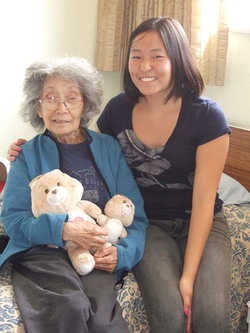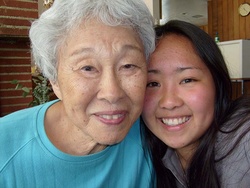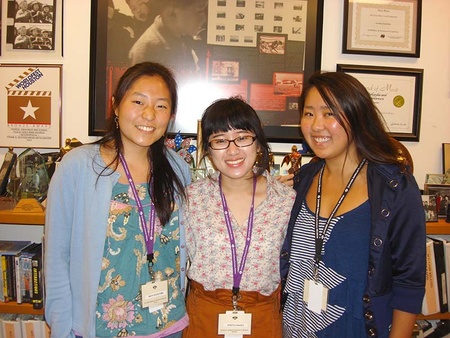Imagine spending your childhood hearing stories about how your grandmother took over the Statue of Liberty with Puerto Rican activists, or how she was present when Malcolm X was shot in the Audubon Ballroom. Better yet, imagine having a professor gush about the literary brilliance of a play written by your own grandmother.
For college students and Japanese American National Museum interns Maya Kochiyama and Alyctra Matsushita, very little imagination was necessary; both happen to be the granddaughters of two celebrated Japanese American community activists—human rights advocate Yuri Kochiyama and artist/playwright Wakako Nakamura Yamauchi.
Upon meditating on her grandmother’s legacy within both the Japanese American and American civil rights movement, Maya Kochiyama is overcome with awe. “Growing up, it was a lot of fun hearing stories about my grandma,” the UC Berkeley junior stated. “A lot of people from the Japanese American community would always tell me that my grandma is such an amazing person.”
Kochiyama never questioned the praise directed towards her grandmother; she was always receptive to her activist grandmother’s reputation as an advocate for the socially and economically marginalized. “My grandma is very humble and doesn’t like to talk about her accomplishments,” Kochiyama stated. “The only time she’d talk about herself was when I’d interview her for a school project or paper; she has a very impressive memory.”
Nevertheless, Kochiyama does admit that she did not truly comprehend the gravity of her grandmother’s legacy as a community and human rights activist until the publication of her 2004 memoir Passing it On, a title that refers to instilling a passion for community and solidarity in future generations. Kochiyama recounts attending its book signing as a momentous event in her life. “The title of the book is Passing it On—meaning passing on the legacy, and that refers to us, the grandkids,” she stated.
“At first we were like, Wow, this is so much pressure—how will we live up to that? But it’s also a good thing because it gives us that kick to start thinking about our community, which is why I wanted to do the Nikkei Community internship this summer and why I’ve been involved in my community since I was young.”
Kochiyama, who is studying to be a physical therapist, treats her summer internship with the Japanese American National Museum’s Website Discover Nikkei, along with her involvement with UC Berkeley’s Nikkei Student Union, in which she has a student leadership position, as her method in trying to keep her grandmother’s vision of community alive. “Although I don’t think I can ever live up to the magnitude of her activism career and all her achievements, her values and what she symbolizes are what I aim to accomplish.”
For Alyctra Matsushita, a senior at UC Santa Barbara, that same sense of community was instilled in her as a young child, though inadvertently. She states, “Growing up, my grandma’s plays got translated into different languages and she got to travel to places like Japan.” However, she admits that being a child at the time, she did not truly grasp the importance of her grandmother’s play being translated and put on in Japan. “Thinking back, it was so cool that she went to Japan; but at the time all I cared about was my grandma bringing me back some shaky pens,” she humorously recalls.
Matsushita, who is double majoring in English and Asian American Studies, has a personal connection to the subject matters she encounters in college; her childhood was spent encountering influential Asian American activists and artists, like Hisaye Yamamoto and Frank Chin, though at the time she met them merely as her grandmother’s friends and colleagues. “I’ve visited home and told my mom, ‘I learned about so-and-so at school,’ and she would tell me, ‘You met him/her when you were two years old!’”
Matsushita has also managed to flummox her professors by informing them of her parentage. “There was one instance where I asked my professor why he chose to read a play written by my grandma and when I told him that I’m her granddaughter his jaw literally dropped,” she revealed. “It’s really cool having a personal connection to the texts that I read for school.”
When it comes to what her grandmother represents to her, Matsushita finds inspiration in the playwright’s unyielding belief in individual principles. One of her favorite stories about her grandmother deals with the subject of the corruptive powers of money. “My grandma was offered a large grant by a very ‘American’ company, who told her she could write about anything she wanted, so she wrote about her camp experience,” Matsushita explained. In a predictable turn of events, the same company that offered the large grant of money disapproved of the subject matter and gave Wakako Yamauchi an ultimatum: to rewrite her own story so that it fit in with their idea of literature or not have it published at all.
“The fact that she refused to change her story has always stuck with me,” Matsushita confessed. “Her ability to stand up for what she believes in and not sell herself out is something that I really admire about her.”
When it comes to the roles that both Yuri Kochiyama and Wakako Yamauchi played in civil rights and Asian American art respectively, Maya Kochiyama and Alyctra Matsushita can only feel extremely fortunate and inspired by their lineage. For Kochiyama, knowing her family’s history has helped her establish her own identity within the community. “In America, there are so many different ethnicities and races, so it’s important to know where you come from and how it fits into everything else,” she stated. “Majoring in Asian American studies has definitely changed my life and made me look at the world and life differently,” Matsushita adds. “It makes you think about how other minority groups were treated in America, not just your own.”
As the granddaughters of two iconic women in Asian American history, both Kochiyama and Matsushita are aware of how the legacies of their grandmothers have influenced their life’s choices. Kochiyama summed up why her familial history is a significant component of her life: “It’s like the Japanese American Museum’s philosophy of not letting internment happen again—it’s important to know your history to know yourself.”
© 2011 Krista Chavez





